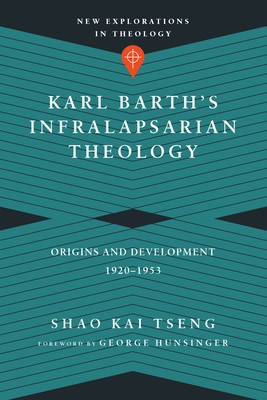
- We will send in 10–14 business days.
- Author: Shao Kai Tseng
- Publisher: IVP ACADEMIC
- ISBN-10: 0830851321
- ISBN-13: 9780830851324
- Format: 15.2 x 22.9 x 2.3 cm, softcover
- Language: English
- SAVE -10% with code: EXTRA
Reviews
Description
Theologians have long assumed that Karl Barth's doctrine of election is supralapsarian.
Challenging decades of scholarship, Shao Kai Tseng argues that despite Barth's stated favor of supralapsarianism, his mature lapsarian theology is complex and dialectical, critically reappropriating both supra- and infralapsarian patterns of thinking. Barth can be described as basically infralapsarian because he sees the object of election as fallen humankind and understands the incarnation as God's act of taking on human nature in its condition of fallenness.
In this New Explorations in Theology volume, Tseng shows that most of Barth's Reformed critics have not understood his doctrine of election accurately enough to recognize his affinity to infralapsarianism and, conversely, that most Barthians have not understood Reformed-orthodox formulations of election with sufficient accuracy in their disagreement with the tradition. Karl Barth's Infralapsarian Theology offers a clear understanding of both the historic Lapsarian Controversy and Barth's distinct form of lapsarianism, providing a charitable dialogue partner to aid mutual understanding between Barth and evangelicals.
Featuring new monographs with cutting-edge research, New Explorations in Theology provides a platform for constructive, creative work in the areas of systematic, historical, philosophical, biblical, and practical theology.
EXTRA 10 % discount with code: EXTRA
The promotion ends in 18d.19:59:49
The discount code is valid when purchasing from 10 €. Discounts do not stack.
- Author: Shao Kai Tseng
- Publisher: IVP ACADEMIC
- ISBN-10: 0830851321
- ISBN-13: 9780830851324
- Format: 15.2 x 22.9 x 2.3 cm, softcover
- Language: English English
Theologians have long assumed that Karl Barth's doctrine of election is supralapsarian.
Challenging decades of scholarship, Shao Kai Tseng argues that despite Barth's stated favor of supralapsarianism, his mature lapsarian theology is complex and dialectical, critically reappropriating both supra- and infralapsarian patterns of thinking. Barth can be described as basically infralapsarian because he sees the object of election as fallen humankind and understands the incarnation as God's act of taking on human nature in its condition of fallenness.
In this New Explorations in Theology volume, Tseng shows that most of Barth's Reformed critics have not understood his doctrine of election accurately enough to recognize his affinity to infralapsarianism and, conversely, that most Barthians have not understood Reformed-orthodox formulations of election with sufficient accuracy in their disagreement with the tradition. Karl Barth's Infralapsarian Theology offers a clear understanding of both the historic Lapsarian Controversy and Barth's distinct form of lapsarianism, providing a charitable dialogue partner to aid mutual understanding between Barth and evangelicals.
Featuring new monographs with cutting-edge research, New Explorations in Theology provides a platform for constructive, creative work in the areas of systematic, historical, philosophical, biblical, and practical theology.


Reviews